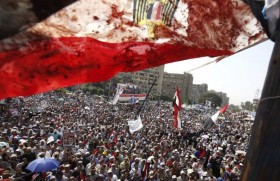 When he was 22, Yehia Hamed joined a banned organization whose members often wound up in prison.
When he was 22, Yehia Hamed joined a banned organization whose members often wound up in prison.
A decade later, Hamed was the campaign spokesman for the winning candidate in Egypt’s first democratic presidential election, going from persecuted to powerful with dizzying speed.
The fall has come even faster. On Wednesday night, with a coup underway and troops pulling up outside the office where he presided as a minister, Hamed fled through the parking garage.
Now Hamed and other Muslim Brotherhood leaders face what they see as a stark choice: a return to oppression or a bloody fight against a military that has held sway in this country for six decades.
For a group that has toggled throughout its history between violence and peaceful opposition, the killing by security forces of dozens of Brotherhood supporters on Monday left its members angry, embittered and at risk, analysts said, of careening toward a more militant and radicalized future.
“The new regime is sending a clear message that [it] is determined to kill, detain political figures, stop media channels,” Hamed wrote in an e-mail after Monday’s violence.
He and other ousted officials vowed more protests and delivered emotional speeches. Bloodied victims at the Brotherhood’s field hospital, set amid a sea of supporters camped out in eastern Cairo, said the “massacre” by Egyptian security forces had only solidified their resolve.
But analysts say the group, founded in 1928, is at a critical crossroads.
Ousted president Mohamed Morsi and a circle of aides, all Muslim Brotherhood loyalists, remain imprisoned incommunicado at the headquarters of the Republican Guard, Brotherhood officials said. Egyptian security forces have rounded up other Brotherhood leaders and shut down two satellite channels deemed sympathetic to the Islamists. Security officials have leaked reports that raided Brotherhood offices had stockpiled weapons.
Whether the Brotherhood will be allowed back onto Egypt’s new political stage is rapidly becoming the critical question, said Samer Shehata, an expert on the movement at the University of Oklahoma.
“If you are pushed out of the political process, then one possibility is a resort to arms,” Shehata said. He dismissed the notion that Egypt would turn into another Algeria, where the military canceled an election on the eve of a predicted Islamist win in 1991, setting off a decade of civil war.
But could the country “revert to what we saw in the 1990s, when there was low-level and continuous terrorist activity for the better part of half a decade? Yeah,” Shehata said. “I think that’s possible.”
The Brotherhood’s leaders have called repeatedly in the days since Morsi’s ouster for peaceful protests. But at Brotherhood rallies, the tension between those calling for peace and those who want to go further has been audible amid the chants and marching feet.
Three prominent Brotherhood members from Egypt’s Nile Delta led a march from the group’s largest sit-in, outside the Rabaa al-Adawiya Mosque in eastern Cairo, to set up an encampment outside the country’s Defense Ministry at dusk on Sunday. The idea was to amplify “the pressure,” said Mohsen Radi, a member of the country’s now-dissolved parliament.
